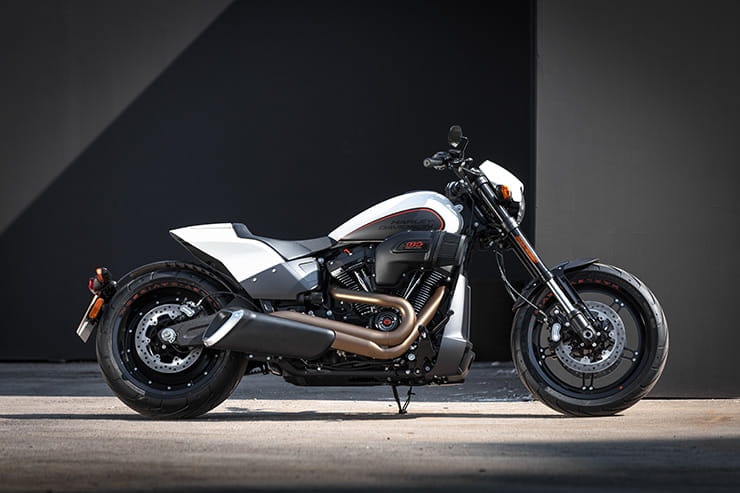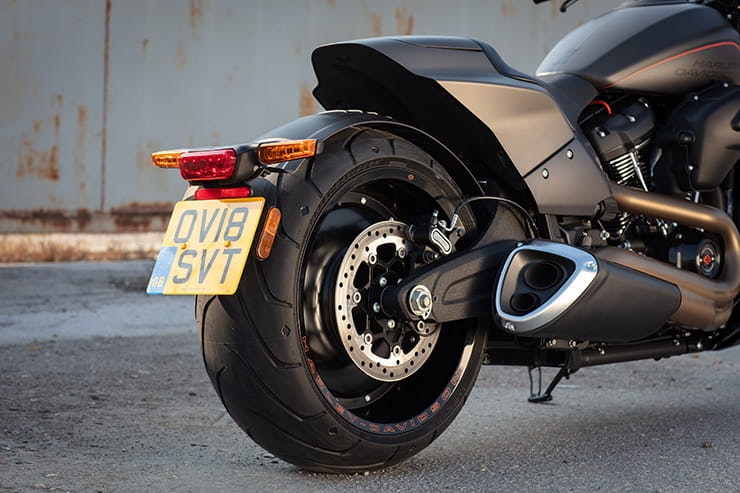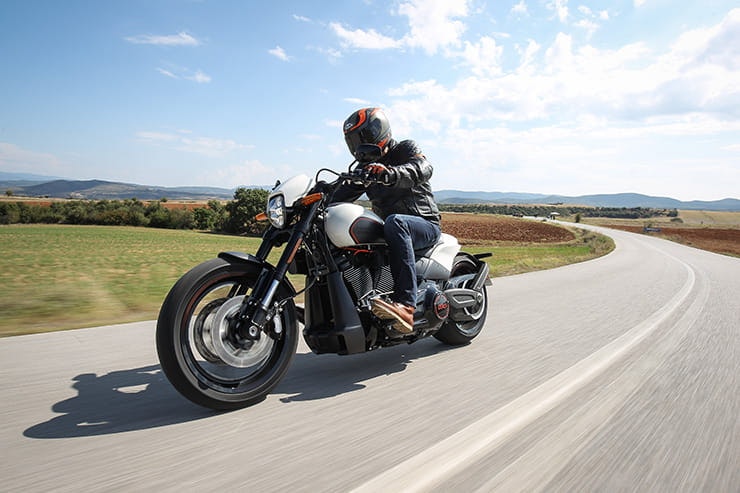Harley-Davidson FXDR Softail (2019) | Review
BikeSocial Road Tester
07.09.2018
KIT CREDITS
Halemt
HJC R-PHA 11 Deroka MC7SF | £360 | www.hjchelmets.eu
Jacket
Oxford Products Highway 2 MS | £170 | www.jsaccessories.co.uk
Boots
Triumph Stoke boots | £160 | www.totaltriumph.co.uk
Gloves
Alpinestars Octane | www.fc-moto.de/en
The 2019 Harley-Davidson FXDR is a power cruiser-styled addition to its fleet of Softails, featuring their most highly tuned 1868cc V-twin combined with a long, low, feet-forward cruiser riding position and a raked-out chassis. At nearly twenty grand, it’s also the most expensive. BikeSocial goes for a ride at the launch in Greece to find out if the sums add up.
Living the Harley-Davidson dream on the FXDR. But does the reality match the fantasy?
Price
The FXDR is £19,855 which makes it the most expensive bike in the Softail range by £2500. It also means the new Harley’ is more expensive than the base model Ducati XDiavel which starts at £16,955.
Built during Ferrous Bueller’s Day Off, the FXDR makes extensive use of plastic and aluminium instead.
Power and torque
89.8bhp @ 4500rpm
118 lb.ft @ 3500rpm
1868cc (or 114 cubic inches if it sounds more impressive) making less than 90bhp must be a production bike record of the wrong kind; but 118 lb.ft of torque at 1rpm redresses the balance.
Engine, gearbox and exhaust
The FXDR is the only Softail without a proper moniker; Harley were planning on calling it the Destroyer but perhaps chose wisely to stick instead with just the DR in FXDR. But for followers of Harley’s current engine line-up, the FXDR’s motor is a familiar chunk of metal: it’s the fuel-injected, semi-liquid cooled, 1868cc version of the Milwaukee 8 – the pushrod, 8-valve, 45° V-twin powering the big, fat, feistier, flagship end of the Softail range.
In the FXDR’s case, it’s also Harley’s most potent stock motor. A lumpier cam profile (there’s one cam per head, for less engine noise) delivers a hint more power and torque than the engine in, say, the Fat Bob, making a claimed 89.8bhp at 4500rpm and 118 lb.ft at 3500rpm.
Now, for owners of rival manufacturers’ power cruisers, notably those from Bologna, the Harley numbers will sound a trifle underwhelming: for example, Ducati’s Diavel makes similar torque, at 8000rpm – but therefore significantly more power; 152bhp at 9000rpm. But of course it depends how you like your power cruiser performance delivered. The Diavel deploys a re-purposed sports motor, using revs to make power and delivering a surging top-end blast; Harley’s FXDR is essentially a custom bike lump, tuned for big torque figures at subterranean rpm – and, arguably, this is a much more logical fit in a bike with cruiser-based ergonomics, styling, ground clearance and steering geometry.
And the new Softail boss delivers a typically hearty, Trump-thumping dollop of Wisconsin chutzpah, galumphing off from its potato-potato tickover like a buffalo with swollen testicles. As per the other current Softails, the FXDR’s power delivery is surprisingly linear and smooth, and noticeably more refined than previous Harleys – counter-balancers have removed the 45° V-twin’s natural jack-hammering that once visibly shook Harley fuel tanks under a pistonic onslaught of reciprocating metal. They’re now so mellow they can be rigidly bolted in the frame rather than rubber-mounted. But there’s still enough whirling mayhem to leave you in no doubt of the bike’s origins. Nothing else this side of a farmyard garage feels quite as mechanically visceral as a Harley, even after it’s been civilised by Euro 4 emissions regs.
And the civilising process hasn’t extended to reining in the FXDR’s boogie in a straight line – dump the weighty clutch at a random set of Greek traffic lights, and the 240-section rear tyre squeals all the way into third gear on the greasy Thessaloniki tarmac. For a bike that’s conceptually close to the old V-Rods, and is halfway between the modern Fat Bob’s ‘sporty’ ethic and the Breakout’s drag-racer styling, the FXDR successfully gets a grip on the street-drag ethos – even if it has less joy with getting grip on Greek roads.
At cruising speeds – that’s motorway cruising, at 70mph, not posing on the seafront – the big V turns over at a lazy 2600rpm with plenty in reserve for higher speeds. But the engine isn’t the limiting factor when it comes to getting your head down; actually getting your head down is. But we’ll come to that.
The FXDR also sounds great, bellowing down twin drainpipe headers coiled along the right side of the bike and sucking lustily through a ramjet-styled airbox. Harley says the intake has a ‘tuned flow length’ and ‘optimized filter geometry’. I’m sure it does; if only it had an optimized location – it juts out and gets in the way of my right knee, creating an asymmetrical riding position that, frankly, sends my OCD alarm off the scale.
Harleys’ have always been criticised, or admired, for their distinctly bovine gearboxes – the Softails, in keeping with Harley’s new-found respect for riders’ sensitivities, are much improved with a slicker action than before. It still ker-plunks with a resounding but indolent thump in a way that would shock anyone brought up on normal transmissions, but the hard edges have been chamfered off the shift.
Economy
The FXDR has a decent-sized 16.7 litre tank, and its onboard trip suggests a full-to-empty range of around 150 miles when it’s brimmed. Harley claim 46mpg, but we aren’t able to confirm it on the launch ride. Whatever the tank range, it’s fair to say it’ll comfortably out-distance your bum and lower back.
16.7 litre tank should be good for over 150 miles, if your back can stand it. Filler cap has no lock.
Handling, suspension, chassis and weight
So having described a successful engine, we now get to a few things at which FXDR is less than skilled. Harley can build bikes that go round corners; the Fat Bob, with ‘sporty’ steering geometry, has a fair go at conventional handling. In fact, it’s possible to hustle it along at a fair old rate of knots.
But the FXDR has its work cut out persuading a titanic wheelbase, raked-out forks and the colossal 240-section rear tyre to have anything but a negative effect on even mildly spirited cornering. It’s obviously styled to look as if it prefers straight lines to corners, but those looks dictate a whole slew of chassis dynamic (and ergonomic) compromises that mean it really does prefer straight lines to corners. And while the FXDR is hardly the first Harley to value form over function, it’s still a shock to rediscover just how plain ornery this style of bike can be. With stiffly sprung rear suspension and limited rear wheel travel, and an added dash of pace, you’re soon straddling a machine markedly reluctant to change direction, exacerbated by its uncompromising ride quality (the 43mm upside down Showas are unadjustable, and the rear shock has remote hydraulic preload only).
The dismal state of the roads on the test route in Greece don’t show the FXDR’s springs or steering in the best light, as it crashes painfully into potholes with a spine-battering crunch. Over smoother sections the FXDR is much less choppy – but by then even raised manhole covers have me flinching. This is not a compliant ride.
Neither is it agile – apart from filtering speeds, when the FXDR is actually quite snappy and flicks easily through snarly traffic. But approach corners at speed and it needs a good heave on the clip-ons (yes, really) to point the front 19in wheel in the appropriate direction – much less alter your line once you’ve committed. Twisty mountain tarmac tries hard to flatter the FXDR, but in return the Harley has more chance of flattening them instead. Every hairpin is a first gear wrestle, with the bike running wide on the exit as it rolls around its space hopper tyre profile. It has the potential to go very wrong if you turn in a bit too hard and there’s something solid coming the other way (although a car/FXDR interface involving another rider on the launch demonstrated how resilient the Harley is – the car lost its entire front end while the Harley remained upright and merely dinged. The rider got a fat foot).
Anyway, it’s at this stage in proceedings a Harley representative points out the FXDR isn’t a GSX-R1000, which wins understatement of the year. But I’m merely comparing it to something like Ducati’s Diavel, which has commendable cornering chops for its looks – the Italian power cruiser has a significantly shorter wheelbase, steeper steering, more trail but less weight, and also shares a 240-section rear. But it shows how a power cruiser-styled machine can also handle half decently.
If you do make a mistake in your road planning and run wide, the FXDR can brake deep into a turn – but it risks losing the raked out front. And while ground clearance is the greatest of the Softail range and pegs don’t go down quite as eagerly as you’d expect, it still grinds like a good ’un once you’ve warmed up.
Weight-wise, the FXDR is lighter than other Softails, but it’s still a big old gal. Overall kerb weight is 303kg; it’s 305kg for the Fat Bob. The FXDR’s honking-great aluminium swingarm is said to be 43% lighter than its steel predecessor, while ‘composite material’ (aka plastic) makes up rear and front huggers.
The lady’s not for turning. This pic demonstrates the confluence of almost every design limitation of the FXDR when it comes to cornering. See if you can spot them all.
Brakes
Twin 300mm discs and four-pot calipers are more than capable of reducing the FXDR’s forward momentum – we shouldn’t be surprised Harley build a bike in 2018 with brakes that work. But with the front tyre so raked out, hard braking will always tend to push the front along rather than bury it into the tarmac, and the parlous state of the Greek roads makes it all too easy to chirp the front, activating its ABS system.
Decent brakes overwhelm the front Michelin Scorcher (really?) on treacherous Greek yoghurt. I mean ‘Greek tarmac’. Easy mistake.
Comfort
If the FXDR’s handling is compromised by its street-drag intentions, its ergonomics are also tough to admire over a day’s ride. Initially all seems well intentioned, with a low, cupped, wide seat and clip-ons reaching back at a natural angle, slightly lower than the Fat Bob’s flat bars. Then you pull away and pedal thin air as your feet scrabble for the foot-pegs. Aha! They’re not down there, they’re up there.
BikeSocial is a broad church that welcomes all tastes, but I can’t pretend I’m a fan of feet-forward foot-pegs and the classic US-style ‘clam-shell’ riding position. They’re in the wrong place for comfortable cruising, to augment control during cornering or to resist acceleration; they’re good for increasing ground clearance and somewhere to put your legs when the seat height is about four inches off the floor. And come to think of it, I can’t remember the last time I saw a competition drag bike with feet-forward pegs <checks Google>.
But, as the FXDR’s commendable feet-forward Fat Bob sibling shows, the result isn’t necessarily uncomfortable immediately – as you settle back into the FXDR’s deep seat and plug your coccyx into its uncompromising chassis, you grip the tank with your knees (or, knee-and-a-half thanks to that mahoosive air filter) and prepare to launch it into the wild blue. And for the first half a day’s riding it’s a tolerable riding position, if never sumptuous or relaxed. Shorter riders complained about reaching the rear brake lever, but my ladylike pins had no problem stretching to the foot controls.
But my unladylike ass had a problem, eventually – after 100 miles the lack of bodyweight support from feet, knees or hands eventually told on my lower back, reducing it to a state of aching irritation. This is not a riding position best suited to gentlemen over a certain age – which, I’d guess, is 95% of the FXDR’s target market.
A Harley with clip-ons? Whatever next? Normal indicators instead of a button on each side, perhaps? Nice finish to the cockpit though.
Equipment
Precious little to go on here – part of the design ethos of a bike like the FXDR is be stripped-down, shorn of frippery (and creature comforts, ahem). No heated grips, no cruise control, no traction control, a bit of ABS honoured more in the breach than the observance, and a weeny digital dash with a fuel gauge, trip meters and tacho option. You don’t even get a pillion pad.
The FXDR’s air filter/right knee interface issue highlighted here with help of strategically placed lens flare.
Harley-Davidson FXDR Softail (2019) Verdict
Nearly twenty grand for a bike that prefers straights – and short ones at that – to corners, but looks good while it’s not doing it, means a fairly short conversation for most people. The FXDR is a very, very specific bike and anyone who buys one will already know they want it regardless of its technical and dynamic abilities or limitations.
Which are: a cracking bottom end performance from the motor, and a squat, muscly styling presence are the highlights. The cornering performance, ride quality and comfort are the FXDR’s shortcomings. But that’s the compromise Harley made when they designed the bike, and it’s exactly the same as the one prospective owners will make when they hand over their wedge.
The last thing most people will see of the FXDR, as they retreat slowly clutching their wallet.
Three things I love about the FXDR
• torque – it bangs like a steam hammer low down
• finish – it’s a bit Marmite styling-wise, but the overall build quality is good
• the first 20 seconds away from the traffic lights – pretty much the FXDR’s only moment in the sun
Three things I don’t…
• handling – isn’t good enough in 2018. Other performance cruisers can go round corners with considerably more aplomb; no excuses
• air filter location – the off-kilter riding position makes my bum go funny
• ride quality – it’s crude and rudimentary. Harley should’ve launched the FXDR at a drag strip; might not have shown it up
Harley-Davidson FXDR (2019) specs
To insure this bike, click here


